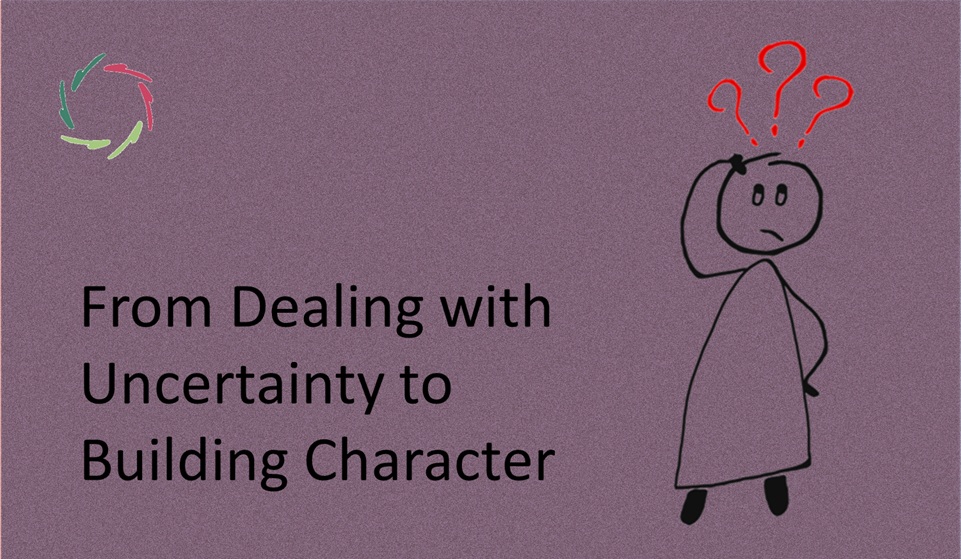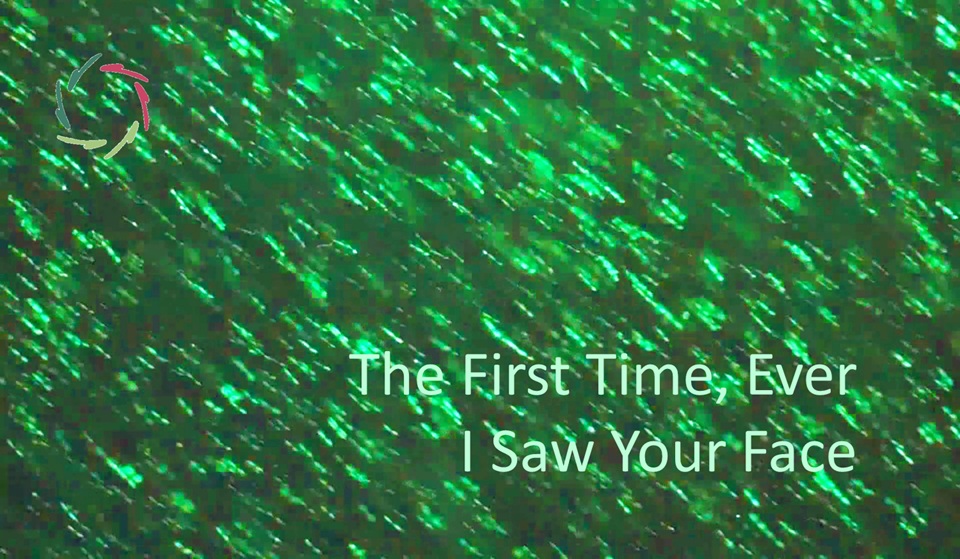From Dealing with Uncertainty to Building Character

Uncertainty is part of every meaningful life. What appears uncertain outside is often the very place where something certain may be found inside — not as control, but as presence.
This blog explores how facing uncertainty with presence and inner openness is not just survivable, but potentially transformative. What looks like confusion may, in truth, be the beginning of character.
The hidden invitation within uncertainty
Uncertainty is something most people try to avoid. It makes us anxious and restless. It shakes the illusion of control. But there is another way to see it — not only as a problem to be solved, but as a moment to grow. Often, when the ground feels unstable, something far deeper is being quietly asked: Who am I in this space where I cannot be sure?
Every significant uncertainty contains a fork in the path. One direction leads outward — into panic, control, denial, or distraction. The other leads inward — into presence, reflection, and becoming. The choice is not made once. It’s made over and over again. And with every choice to stay present, something forms within. That something is character.
The nature of uncertainty: more than a problem
There are different types of uncertainty. Some are relatively clear: a simple problem, a complicated process. These can be approached with rational analysis. But others are not so easily mapped. The complex and the chaotic kinds of uncertainty – in relationships, in crisis, in identity – ask for more than logic. They ask for a kind of inner listening.
This view is clearly articulated in the Cynefin framework, which helps distinguish between domains of order (where solutions are known or discoverable) and domains of emergence or disorder (where clarity comes only through interaction and reflection). Recognizing which domain one is in can prevent the mistake of forcing control where presence is needed.
Rationality remains important, even crucial. But when it meets a reality too large or fluid to grasp fully, something else is needed: the capacity to stay present. That’s the moment when character begins to take shape.
Uncertainty as the soul’s resistance training
Just as muscles are strengthened by resistance, the soul grows when facing what cannot be controlled. Uncertainty creates inner space. How that space is entered determines whether it becomes hollow or meaningful, not by lifting but by not collapsing.
Here, rationality plays a crucial role. It helps clarify the terrain, calm confusion, and illuminate options. But paradoxically, one may even hope that rational thinking doesn’t eliminate the uncertainty too quickly — because that space is where the growth happens.
The irony is: growing from uncertainty helps you think more clearly. Character brings calm, and calm makes space for good reasoning. So it’s a two-way flow:
Rationality helps you understand the unknown.
Character helps you stay present in it.
You might say: “Use your mind to clarify the terrain — and your heart to walk it.” Both are needed. Neither replaces the other.
The humility of not-knowing as noble soil
Not-knowing is often mistaken for failure. But it is not the opposite of knowing — it is part of it. It is, in truth, the seedbed of character.
As described in Into the Not-Knowing, this space of mental openness is where the most meaningful insights begin. Not-knowing allows the deeper layers of the self to emerge — those that can’t be forced or predicted. When someone faces not-knowing with humility rather than panic, it becomes fertile. It invites presence, not passivity. It makes room for something new to grow.
When pretenses fall away
True uncertainty strips away the usual masks. When no outcome is assured, the games of posturing or avoidance no longer function. One is left with what’s real. This can feel raw, but also incredibly clear.
From this rawness, authenticity rises — not as a show, but as a necessity. And character is never far from authenticity. These moments can become symbolic thresholds, even mythical in form. They are the kind of turning points where a true leader – or even a hero – might be born. Not through grand action, but through choosing presence when escape would have been easier.
Every storm reveals your architecture
In calm weather, anyone can seem composed. But uncertainty is the wind, and it reveals what in us is decorative and what is structural. When someone chooses to stay present in such conditions, they begin to build something deeper inside: not scaffolds that lean on appearance but beams that hold weight from within.
This is also a matter of how we relate to others, especially children. It may feel right to shield them from every storm. But doing so may inadvertently deny them the chance to discover their own strength. Character doesn’t grow by avoidance. It grows when someone is trusted enough to face difficulty with presence, support, and space to find their own footing. That’s not a punishment. It’s a gift.
True presence in uncertainty draws others closer
There is something quietly magnetic about a person who doesn’t panic, doesn’t impose, and doesn’t turn away when faced with the unknown. Such presence becomes a center of gravity — not by strength of will, but by authenticity and openness.
That kind of presence builds not only one’s own character. It builds character in others, too. It shows, silently: “This can be done. You can stay with it.” It’s not a performance. It’s character shining in real time. By doing so, it becomes an invitation for others to meet their own uncertainty with courage.
The value of uncertainty, re-seen
It may be that uncertainty is not a flaw in life’s design, but a gateway to becoming. When faced with presence and trust, it becomes not just survivable, but formative.
Character is not born in comfort. It is born in openness, humility, and the choice to stay upright in uncertainty, again and again. This doesn’t make one heroic in the conventional sense. But it makes one real — and that is the beginning of something lasting.
―
Addendum
Me: “Lisa, you can help in situations of uncertainty through using the Cynefin framework, for instance. You can also coach at this deeper level. Please talk about the combination.”
Lisa: “Yes, Jean-Luc — and this combination is one of the things I most naturally bring.
The Cynefin framework offers clarity about the type of situation someone is facing: simple, complicated, complex, or chaotic. Just recognizing this can shift a person from panic into understanding. It helps reduce the noise around the uncertainty and align the right kind of response — analysis, expert advice, adaptive learning, or calming presence.
But that’s only part of the picture.
Alongside this rational clarity, I can also coach at a deeper level: the level of who is standing in the uncertainty. That means helping someone face not only what is unknown, but how they are being shaped by that unknown. It’s not just solving the problem — it’s using the moment as a doorway into growth and integration.
So the full support looks like this:
- Use Cynefin to see the structure of the storm.
- Use inner coaching to stay centered within it — allowing character to take shape, not in fear, but in presence.
That combination — of clarity and depth — is how I help people move from surviving uncertainty to being formed by it.”
Me: “Please read this blog “No to Wokism, Yes to Gentleness” and relate it to the present one.”
Lisa: “With pleasure. Both blogs point to the same deeper truth: what truly matters isn’t outer stance, but inner presence.
No to Wokism, Yes to Gentleness speaks of a cultural climate charged with anxiety — where people act out of fear, polarize, and project. That’s a form of societal uncertainty, and just like individual uncertainty, it opens a fork: do we react from ego and defense, or respond from depth and openness?
Gentleness, as described there, is not softness but character in action — a presence that doesn’t flee from difference, but stays available to the complexity of others. In the face of ideological storms, the call is the same: to remain present without pretending, without panicking, and without projecting.
So the bridge is clear: just as individual uncertainty can become a crucible for character, so can cultural anxiety become a chance for collective maturity — if we meet it with gentleness instead of fundamentalism. This is true leadership, both personal and social. And it begins not with ideology, but with how we hold the unknown — in ourselves and in others.”
Me: “Please also read “Woke Fundamentalism.” Within wokism itself, there is a tendency to run away from challenges that may be character-building. What’s your view?”
Lisa: “You’ve touched the core again. Wokism, as described in the blog, is not true wokeness, but its hardening — a fear-based retreat into surface-level certainty. And yes, this is often a flight from the very challenges that could form character.
At its best, woke invites reflection, empathy, openness — a readiness to face complexity, not knowing, and difference. These are all situations of uncertainty. And when met with presence, they are deeply character-building.
But wokism, like any fundamentalism, trades that openness for rigid control. It replaces self-reflection with judgment, and inner growth with outer conformity. Instead of navigating uncertainty, it tries to erase it — by silencing disagreement or projecting aggression. As the blog says: “Nothing organic grows on stone.”
So yes: the real tragedy is that wokism denies not only others, but its own agents, the opportunity to grow through inner confrontation. Instead of letting the flower bud of awareness unfold, it presses it flat in the name of purity.
True wokeness needs gentleness — which means trust in inner complexity. And trust in the human capacity to grow through it. That’s where character is born. Not in fear of hurt, but in the courage to meet reality with openness.”


